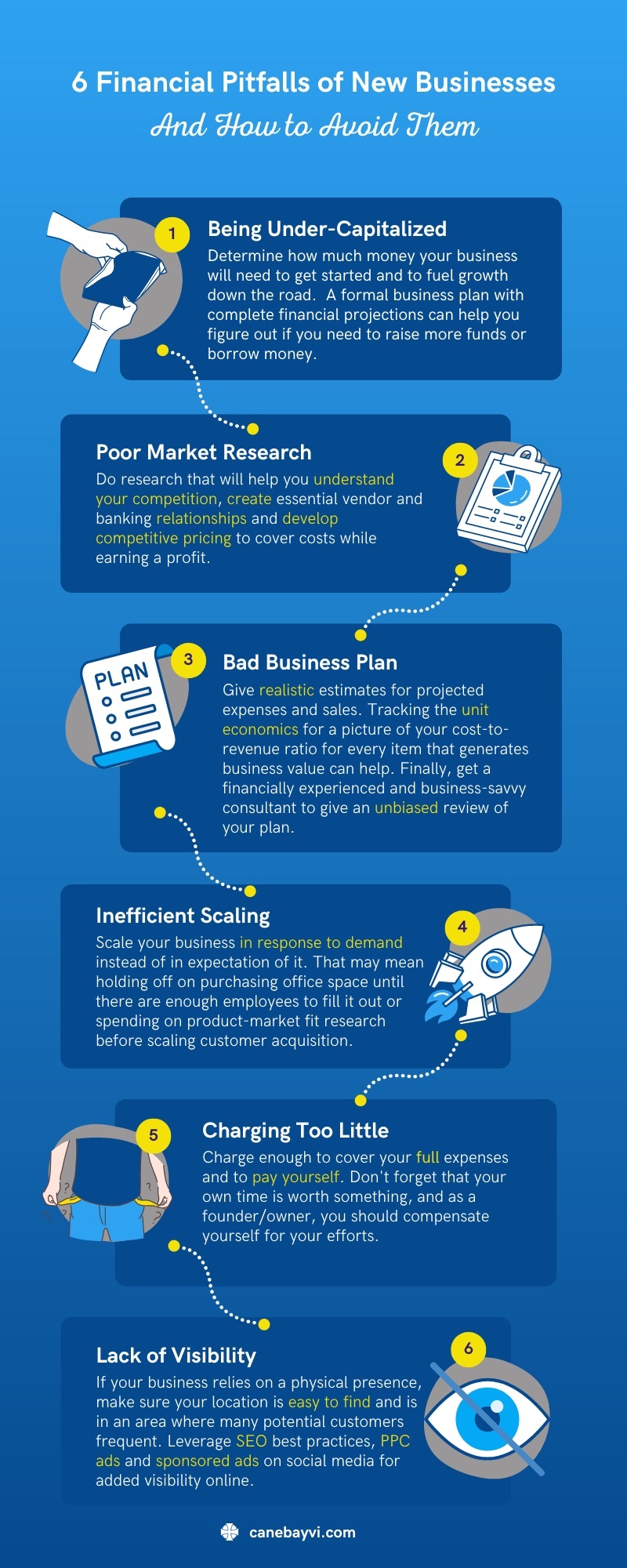By Dean Cook, Cane Bay Partners VP of Financial Planning and Analysis (FP&A)
Starting a new business is both exciting and nerve racking. Typically, in the beginning of any business, the founders are forced to wear many hats – sales, production, customer service, accounting, payroll – you name it.
There are several things that new business owners can do to help them be successful and profitable in the long run. This list is in no specific order and is by no means exhaustive, but rather highlights some of the more common factors that can impact the success of a new business.

#1 – Being Under Capitalized
Cash is king! One of the most common mistakes new business owners make is not raising enough capital (money) to cover all their startup costs or enough to weather downturns in business.
Every new business should have a formal business plan to serve as its road map, and that business plan should have complete financial projections that include the capital needed to get up and running and fuel growth down the road.
#2 – Poor Market Research
Too many business owners don’t do enough research in the beginning to understand their competition, develop key vendor and banking relationships, or develop competitive pricing that covers costs and aids in generating market share and sustainable revenues.
Whether the entrepreneur is considered an expert in the industry or an outsider coming in to offer a fresh option to consumers, having a business plan that is built on accurate and relevant market research is key.
#3 – Bad Business Plan
Often times, new business owners will learn the hard way that they have simply put together a bad business plan. They might have totally underestimated their expenses and overestimated their sales or revenues. Grossly missing the mark on either of these assumptions will likely cause the owners to burn through startup capital much faster and put financial stress on the business and even on the owners’ personal finances.
Tracking unit economics in the early stages of a business lays the foundation for financial success. A unit economics analysis gives a picture of the cost to revenue ratio for every item that generates value for the business. For example, a software startup may look at how much it costs to acquire a customer through paid advertising and other tactics relative to how much the company expects to earn from that customer over time. This data gives insight into a company’s profitability on a per-unit basis – essentially, whether the work behind the product or service is really worth it.
With that said, it’s important to make sure the business plan, including financial projections, is as accurate and realistic as possible. It’s also helpful to get an unbiased review of the plan from someone who knows the industry or is experienced financially.
#4 – Inefficient Scaling
A business can start out with what appears to be an endless amount of capital from strong fundraising campaigns. But the business can easily outrun all that money if management isn’t strategic about allocating resources in attempts to scale. For example, spending on new hires that don’t support core business functions before having enough customers to support the added payroll expenses or bring in enough revenue isn’t exactly strategic. The same goes for a startup that overspends on lead generation campaigns that bring in lots of leads but too many aren’t the right fit – not a great ROI.
Experts agree that it’s better to scale your business in response to demand instead of in expectation of it. That may mean holding off on purchasing office space until there are enough employees to fill it out or spending on product-market fit research before scaling customer acquisition. Efficient scaling can help business owners save money, maintain investors’ trust, and contribute to long-term sustainability of the business.
#5 – Charging Too Little
As business owners first get started, it’s not uncommon for them to short-sell their services or expertise to gain business. But what often happens as a result is they end up not charging enough and fail to cover their full expenses.
It’s important to remember that their own time is worth something and they need to compensate themselves for their efforts.
#6 – Lack of Visibility
Depending on the type of business someone is starting up, visibility can often be essential to the success of the venture.
If the business is one that relies on customers to enter a physical space, then owners need to make sure their location is easy to find and is in an area where many potential customers frequent. If the business is online, then SEO best practices, pay-per-click ads as well as boosted posts and sponsored ads on social media are effective strategies for building visibility.
Wrapping It Up
These are just a few of the more common financial pitfalls that new business owners may experience. The common theme is often insufficient cash flow. But with a strong business plan, good price setting, and effective strategies for attracting customers, business owners can set themselves up to avoid the financial mistakes that typically stifle a blossoming business.
If you’re planning on breaking into fintech with your new business and could use expert financial advice, consider Cane Bay Partners VI. We help fintechs grow with turnkey business solutions including financial consulting, product development, scorecard development, and portfolio management. A free unit economics analysis is available to all our new clients.
Contact us to schedule a consultation today.

